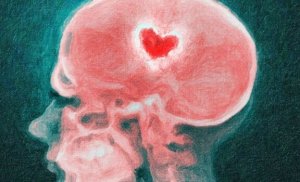Your Brain During a Breakup: The Science of a Broken Heart


Written and verified by the psychologist Valeria Sabater
During a breakup, your brain can experience deep anxiety. What’s more, science has demonstrated that it isn’t the heart that suffers the most. The hardest hit is a series of cerebral structures that interpret your disappointment or abandonment as a wound. The impact of the breakup is something the brain doesn’t know how to process. This neurological situation translates into physical pain, exhaustion, and low energy.
Over the course of history, few things have inspired us as much as breakups. Countless songs, poems, and books pulled directly from pieces of the artists’ broken hearts. These are legacies that fascinate and delight so many of us. We even use them for comfort when we are unlucky in love. In all of these examples of creative expression, we find the same word over and over again: pain.
“How I wish, how I wish you were here. We’re just two lost souls swimming in a fish bowl, year after year. Running over the same old ground…”
– Pink Floyd-
Breakups, cheating, neglect… These all cause a lot of pain, we all know that. But the reason behind that pain couldn’t be more fascinating. It isn’t necessary to get physically hit, scratched, or burned. Breakups manage to cause a combination of all of that without ever touching you. It’s the impression of suffering that comes out in each fiber, tendon, and joint in your body. Everything hurts, everything wears you out. The world disappears and you get trapped in this emotional storm. The storm, as it turns out, is happening very far from your heart, the very organ we usually blame.
True suffering starts in the brain. Let’s take a look at how the brain works during a breakup.

What science says about your brain during a breakup
If you want to understand what happens in your brain during a breakup, forget about songs, poetry, and literature. Enter, instead, into the world of neuroscience. We know that many people believe that you can’t measure love and hate in a lab. However, as cold and sterile as it may seem at first, science is precisely what gives us the most revealing answers.
In 2011, a cognitive neuroscientist at Columbia University named Edward Smith did a series of studies and tests. The results were surprising. Thanks to the advances in diagnostic techniques and improved MRI resolution, he was able to see what happens in the brains of people who have just gone through a breakup.
In the images, the parts of the brain that light up the most have the most synaptic activity. In the case of the study participants, the most active brain structures were the same that work when you burn yourself. To the brain, pain is real.
Let’s learn more…
The guilty party: our neurotransmitters
Why does your suffering last so long when you are in mourning? Why does it hurt so much to remember? Why does your mind keep coming back to that face, that name, that past history? The answer is in your neurotransmitters.
- When you experience a breakup, the prefrontal cortex “turns off”. In other words, your ability to objectively process information stops functioning.
- At the same time, all the structures related to attachment and bonding are activated. The limbic system regulates hormones like oxytocin and dopamine. They, in turn, continue to regulate the need to have the other person close. This hyperactivity makes us try and reinitiate contact and try again. It makes it very difficult to see what is happening with objective eyes.

The brain in a state of withdrawal
Helen Fisher, celebrated anthropologist and expert in relationships, believes that love is a motivational system. She thinks that love is an impulse that seeks to offer the brain a series of rewards. These can range from attachment, intimacy, and commitment, to sex, relief from loneliness, etc…
So, what the brain experiences above all during a breakup is the loss of all those dimensions. When that happens, it enters a state of panic. That reward system is broken, and the brain now lacks nutrients, security, everything. The brain then enters a state of withdrawal. This is the same thing that happens to an addict when you take away whatever substance they are addicted to.
During a breakup, physical pain is real
We mentioned at the beginning that you experience the pain of a breakup the same as physical pain. When someone you love leaves you, it doesn’t take long for the body to release a flood of stress hormones like cortisol and epinephrine. What does all this mean? Basically, it means that emotional angst becomes physical. It also means that those chemicals significantly alter many of your functions.
- When you have too much cortisol in your brain, it sends signals to increase the blood supply to your muscles. That causes cramps, tension, headaches, chest pain, dizziness, physical exhaustion, etc…

The brain during a breakup is like a frightened organism. In some ways, this forces you once again to set aside the idea that your brain is like a computer. Nothing is so subject to and orchestrated by emotions as your brain. Each connection and structure of this fascinating organ lives for the feelings and drive that make us human.
The human brain loves love. The loss of love terrifies the brain, so it reacts in an intense way. We all know that. However, there is something that the brain also knows how to do. The brain knows how to get over a breakup and move on. It will need time, peace, and distractions, but it will adjust. We have sufficient skills to recover from all kinds of trials and tribulations. We come out on the other side a lot better.
During a breakup, your brain can experience deep anxiety. What’s more, science has demonstrated that it isn’t the heart that suffers the most. The hardest hit is a series of cerebral structures that interpret your disappointment or abandonment as a wound. The impact of the breakup is something the brain doesn’t know how to process. This neurological situation translates into physical pain, exhaustion, and low energy.
Over the course of history, few things have inspired us as much as breakups. Countless songs, poems, and books pulled directly from pieces of the artists’ broken hearts. These are legacies that fascinate and delight so many of us. We even use them for comfort when we are unlucky in love. In all of these examples of creative expression, we find the same word over and over again: pain.
“How I wish, how I wish you were here. We’re just two lost souls swimming in a fish bowl, year after year. Running over the same old ground…”
– Pink Floyd-
Breakups, cheating, neglect… These all cause a lot of pain, we all know that. But the reason behind that pain couldn’t be more fascinating. It isn’t necessary to get physically hit, scratched, or burned. Breakups manage to cause a combination of all of that without ever touching you. It’s the impression of suffering that comes out in each fiber, tendon, and joint in your body. Everything hurts, everything wears you out. The world disappears and you get trapped in this emotional storm. The storm, as it turns out, is happening very far from your heart, the very organ we usually blame.
True suffering starts in the brain. Let’s take a look at how the brain works during a breakup.

What science says about your brain during a breakup
If you want to understand what happens in your brain during a breakup, forget about songs, poetry, and literature. Enter, instead, into the world of neuroscience. We know that many people believe that you can’t measure love and hate in a lab. However, as cold and sterile as it may seem at first, science is precisely what gives us the most revealing answers.
In 2011, a cognitive neuroscientist at Columbia University named Edward Smith did a series of studies and tests. The results were surprising. Thanks to the advances in diagnostic techniques and improved MRI resolution, he was able to see what happens in the brains of people who have just gone through a breakup.
In the images, the parts of the brain that light up the most have the most synaptic activity. In the case of the study participants, the most active brain structures were the same that work when you burn yourself. To the brain, pain is real.
Let’s learn more…
The guilty party: our neurotransmitters
Why does your suffering last so long when you are in mourning? Why does it hurt so much to remember? Why does your mind keep coming back to that face, that name, that past history? The answer is in your neurotransmitters.
- When you experience a breakup, the prefrontal cortex “turns off”. In other words, your ability to objectively process information stops functioning.
- At the same time, all the structures related to attachment and bonding are activated. The limbic system regulates hormones like oxytocin and dopamine. They, in turn, continue to regulate the need to have the other person close. This hyperactivity makes us try and reinitiate contact and try again. It makes it very difficult to see what is happening with objective eyes.

The brain in a state of withdrawal
Helen Fisher, celebrated anthropologist and expert in relationships, believes that love is a motivational system. She thinks that love is an impulse that seeks to offer the brain a series of rewards. These can range from attachment, intimacy, and commitment, to sex, relief from loneliness, etc…
So, what the brain experiences above all during a breakup is the loss of all those dimensions. When that happens, it enters a state of panic. That reward system is broken, and the brain now lacks nutrients, security, everything. The brain then enters a state of withdrawal. This is the same thing that happens to an addict when you take away whatever substance they are addicted to.
During a breakup, physical pain is real
We mentioned at the beginning that you experience the pain of a breakup the same as physical pain. When someone you love leaves you, it doesn’t take long for the body to release a flood of stress hormones like cortisol and epinephrine. What does all this mean? Basically, it means that emotional angst becomes physical. It also means that those chemicals significantly alter many of your functions.
- When you have too much cortisol in your brain, it sends signals to increase the blood supply to your muscles. That causes cramps, tension, headaches, chest pain, dizziness, physical exhaustion, etc…

The brain during a breakup is like a frightened organism. In some ways, this forces you once again to set aside the idea that your brain is like a computer. Nothing is so subject to and orchestrated by emotions as your brain. Each connection and structure of this fascinating organ lives for the feelings and drive that make us human.
The human brain loves love. The loss of love terrifies the brain, so it reacts in an intense way. We all know that. However, there is something that the brain also knows how to do. The brain knows how to get over a breakup and move on. It will need time, peace, and distractions, but it will adjust. We have sufficient skills to recover from all kinds of trials and tribulations. We come out on the other side a lot better.
This text is provided for informational purposes only and does not replace consultation with a professional. If in doubt, consult your specialist.







